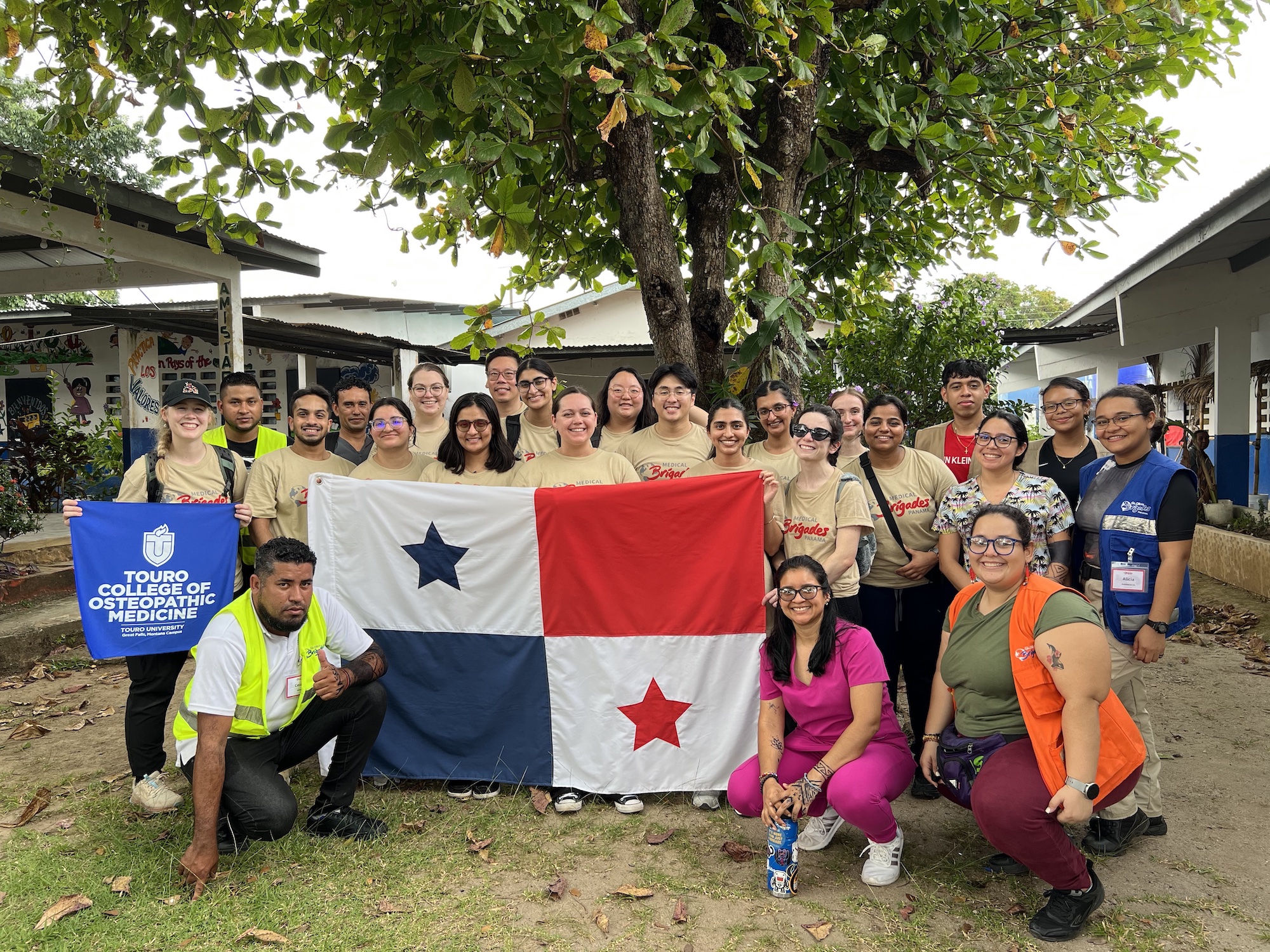“A Glimpse of Our Future”
On Medical Mission to Panama, TouroCOM Montana Students Help and Learn About Medical Disparities

Students from Touro College of Osteopathic Medicine’s Montana campus, applied their skills and knowledge during a medical mission with Global Medical Brigades in Panama. The seven-day trip, which took place during winter break, included 15 students from the first- and second-year classes. The experience provided hands-on learning about healthcare disparities.
"It's a privilege and honor to learn about medicine," said second-year student Christina Chung, who, as the school's global health liaison, helped organize the trip. "We have this gift and ability, and we shouldn’t take it for granted, especially where health disparities are so evident. We have the tools to reduce these inequalities and provide quality healthcare—a fundamental human right."
Hands-On Care in Remote Communities
The team set up makeshift clinics to provide consultations, dental care, and health education in remote villages. Each morning, they established a triage station, where students collected vital signs, medical histories, and chief complaints. Some shadowed physicians, observing diagnoses and learning about prescription decisions. Others assisted dentists with tooth extractions, sterilized tools, and comforted nervous patients.
"We even had a station called 'charla'—which means 'chat' in Spanish," Chung said. "There, we taught patients about nutrition and exercise. The kids especially loved the interactive activities—we had them sort foods into categories to understand what makes a balanced meal."
Second-year student Sashah Seher Shariff said the trip reinforced her motivations for pursuing medicine. "I’m Muslim, and I grew up doing a lot of service with my parents. Helping others has always been important to me, and this experience showed me how much we have to give."
At the pharmacy station, students helped dispense medications under the supervision of pharmacists, ensuring patients understood how to take them properly. Meanwhile, the data informatics team recorded patient information to help Global Medical Brigades track long-term care, ensuring follow-ups for returning patients.
"We weren’t just treating people for a day and leaving," Chung emphasized. "There was real continuity of care. Many of the patients we saw had been to the clinic before, so we could monitor progress and provide follow-up treatment plans."
Lessons in Global Medicine
For second-year student Dylan Cruz, the experience was both eye-opening and deeply personal.
"For me, it wasn’t a huge shock," Cruz said. "My parents come from a place similar to Panama, where healthcare is scarce. I already knew these conditions existed, but it was incredible to finally put into practice what we’ve been learning."
Cruz recalled one particularly intense moment.
"A woman passed out in front of me, and someone called for help. They handed me a butterfly IV and asked me to insert it. Before I could, another volunteer—a former ICU nurse—stepped in and did it. It was surreal to be in an emergency situation, watching doctors and nurses in action. It felt like a glimpse into our future."
The experience also challenged students' assumptions about medical care.
"We were really surprised when physicians routinely prescribed anti-parasitic medications for patients with abdominal pain," Chung said. "In the U.S., that’s not something we typically do. But here, with food and water contamination, it’s a common treatment."
Dental health was another major concern.
"People came in with severe tooth pain because they had no access to regular dental care," Chung explained. "Many needed extractions, and our team assisted with them. It was eye-opening to see how something so preventable could cause so much suffering."
Shariff emphasized the mission’s long-term impact.
"We weren’t just giving people medication and moving on," she said. "We were providing education—teaching them about healthy diets, chronic illness prevention, and managing conditions like high blood pressure and diabetes. Many didn’t even realize they had these issues, but learning simple steps to improve their health could make a huge difference in their lives."
A New Perspective on Medicine
The trip left a lasting impact on the students.
"This experience motivated all of us to pursue more global work," Chung said. "We want to be the best physicians we can—not just to serve locally, but to develop a heart for global medicine."
Since returning, members of the group have begun planning another medical mission trip.
"It’s a privilege and an honor to study medicine," Chung reflected. "We have this gift, this ability, and we shouldn’t take it for granted—especially when healthcare disparities remain so extreme. We have the tools to help close that gap."
For Chung, the experience confirmed her passion for global medicine.
"I’ve always wanted to do something meaningful with my life," she said. "Seeing these doctors work with such compassion and hope—it inspired me. This is exactly why I chose medicine in the first place."

